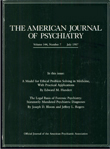Cyclic AMP signal transduction in posttraumatic stress disorder
Abstract
Cyclic adenosine 3',5'-monophosphate (cAMP) signal transduction was examined in lymphocytes and platelets obtained from patients with posttraumatic stress disorder. Intact lymphocytes from the posttraumatic patients (N = 10) showed significantly lower basal, isoproterenol-, and forskolin-stimulated cAMP levels than those from 10 healthy control subjects. In platelet membrane preparations, basal, forskolin-, aluminum chloride plus sodium fluoride-, and prostaglandin E1-stimulated adenylate cyclase activity levels were all significantly lower in the posttraumatic group than in the control group. The authors discuss the potential role of their findings as a biological marker for posttraumatic stress disorder.
Access content
To read the fulltext, please use one of the options below to sign in or purchase access.- Personal login
- Institutional Login
- Sign in via OpenAthens
- Register for access
-
Please login/register if you wish to pair your device and check access availability.
Not a subscriber?
PsychiatryOnline subscription options offer access to the DSM-5 library, books, journals, CME, and patient resources. This all-in-one virtual library provides psychiatrists and mental health professionals with key resources for diagnosis, treatment, research, and professional development.
Need more help? PsychiatryOnline Customer Service may be reached by emailing [email protected] or by calling 800-368-5777 (in the U.S.) or 703-907-7322 (outside the U.S.).



